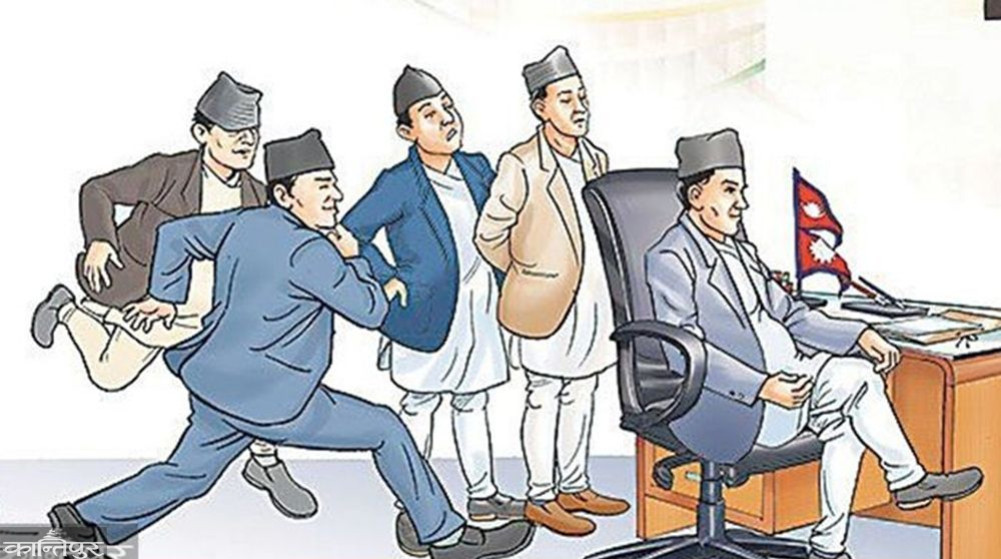Even if the law is passed, Nepal's 'grey list' risk remains in asset laundering
We use Google Cloud Translation Services. Google requires we provide the following disclaimer relating to use of this service:
This service may contain translations powered by Google. Google disclaims all warranties related to the translations, expressed or implied, including any warranties of accuracy, reliability, and any implied warranties of merchantability, fitness for a particular purpose, and noninfringement.


Despite the creation of laws related to the prevention of money laundering, the risk of Nepal being on the negative list (grey list) is still high if there is no improvement in other standards of implementation.



Representatives of the Financial Action Task Force (FATF) and the Asia Pacific Group (APG), an international organization that oversees money laundering, who came to Nepal for an on-site assessment of the improvement situation in the areas suggested by the mutual evaluation report, said that the risk of "grey list" still exists. The team of FATF and APG has returned from February 1 to 4 after conducting an on-site study on the latest situation in Nepal. While the
team is still in Nepal, the House of Representatives of the Federal Parliament has passed the amended 'Bill to Amend Certain Acts' to prevent money laundering. The Bill is yet to be passed by the National Assembly and approved by the President. FATF and APG have said that even though the bill has been passed by both bodies, the law enforcement and investigation aspect (effective rating) is very weak, so unless it is improved, there is still a high risk of 'grey list' for Nepal.
"The team has pointed out weaknesses such as the lack of high political commitment in Nepal, the law enforcement and investigation side being very lax, the lack of ruthlessness in financial crime control," the source said, "Nepal's weakness is seen in the law enforcement and investigation side. Therefore, the team's suggestion is to be ruthless in taking action against those involved in financial crimes.'
Based on the recommendations of the mutual evaluation report, Nepal is currently under the supervision of FATF. If the specified criteria are not met within a period of one year till next October (October 2024), Nepal will be included in FATF's 'Grey List'. Nepal will have to do a lot to prevent financial crimes to avoid the "grey list". Most of them are related to law enforcement, investigation, implementation and other areas," the source said, "We have not been able to make significant improvements in these areas. Therefore, it is unlikely that we will improve by next October and avoid the risk of gray list. The goal now is to reduce the duration of the gray list by doing more work in this area.'
Although some work has been done by the court, the Money Laundering Investigation Department, the Abuse of Authority Investigation Commission, the Nepal Rastra Bank, the Securities Board and other agencies for the control of money laundering and financial crimes, sources claim that they are not enough to avoid the risk of 'grey list'. "Nepal has not yet completed the minimum work set by the international world in the areas of regulation and evaluation of non-profit organizations, new technology (crypto currency and digital currency), casinos, real estate, human trafficking, etc." Political commitment (high political commitment) and its effective implementation.'
Nepal has fulfilled only less than half (about 45) percent of the standards set by FATF for money laundering and financial crime control. The mutual evaluation report of APG under FATF published last August showed that there is a high risk of Nepal being on the negative list (grey list) due to lack of necessary legislation and zero achievement in investigation and action. According to the
report, the standards to be followed by Nepal and other countries are divided into two parts, law enforcement and research aspect (effective rating) and law making and institutional aspect (technical compliance rating). According to this, there are 40 criteria of 'Technical Compliance Rating'. The standard compliance status in this group is divided into four categories: compliance (full compliance), highly compliance (compliance), partial compliance (partial compliance) and non-compliance (non-compliance). Among those standards, Nepal's condition is compliance in five, highly compliance in 16, partial compliance in 16 and non-compliance in three.
Any country must meet compliance or high compliance in at least 21 of the 40 standards in this group to avoid the 'grey list', which Nepal has completed. At least 36 criteria under this group will be fulfilled after the passage of the bill passed by the National Assembly and approved by the President to amend some of the amendments passed by the House of Representatives last week. This means that Nepal will not be included in the gray list because the criteria in this indicator are not met.
But the risk is high because the standards under the current law enforcement and research aspect (effective rating) cannot be met. Under this group, 11 criteria have been specified. These standards are also assessed in four categories: high compliance, substantial compliance, moderate and low. To avoid the 'grey list', a country like Nepal should achieve high compliance or substantial compliance in at least 3 of the 11 standards in this group. But currently, Nepal has received moderate evaluation in 4 out of 11 and low evaluation in 7.
received moderate evaluations in risk policy and coordination, international coordination, financial intelligence, and investigation and prosecution under the law enforcement and investigation aspect. The report pointed out that the remaining parameters such as supervision, control measures, legal persons and management, confiscation were rated low. Since the norms of this group are fully linked to the investigation and enforcement aspects, it is certain that the FATF will be at negative risk if the state does not comply effectively.
After the on-site assessment of Nepal, APG submitted a preliminary report of mutual assessment to the government in March 2019. In the report, it was warned that Nepal could be on the negative list due to the ineffectiveness of the state agencies and the protection of the state in major financial crimes.
In the 23rd Annual General Meeting of APG held in Canada last June (July 9-14), the situation in Nepal was discussed based on the report. The final report after the discussion was published last October. The report has pointed out that the state's regulatory agencies are very indifferent to the monitoring of suspicious investments, illegal money transactions, the state's determination to investigate illegal assets, the risk-based customer identification system is not implemented (especially in the case of high-ranking individuals and the real rich), and risk-based management measures are not adopted. The report emphasized that the legal and institutional capacity of the monitoring agencies in controlling wealth laundering and financial crimes is weak.
FATF does not place any country on a negative or blacklist at once. If it is found that the standards are not fulfilled in the periodic evaluation, it will be placed in the 'Grey List' first and then only in the 'Black List'. Although the General Assembly of FATF passed the recommendation of the APG report to put Nepal on the gray list, they get six months to one year for the reforms. Now Nepal has got that time. Even in the time available for reform, Nepal has not been able to pass laws, nor has research and regulation been strengthened. Looking at the achievements of the last 6 months, experts say that there is no possibility that the minimum standards will be met in the rest of the period.
The annual report of 'Financial Intelligence Unit - FIU Nepal' has shown that activities related to financial crimes including money laundering have increased significantly in Nepal in the last financial year. Experts say that even though the number of reporting threshold transaction reports (TTR) required by concerned agencies to FIU has decreased during that period, the increase in complaints of suspicious transactions also confirms the increase in activities related to financial crimes. They say that since there is a problem of good governance in all areas of the country, along with the increase in economic activities, complaints related to financial crimes may also increase. According to the
report, 2,780 suspicious transactions (Suspicious Transaction Reporting and Suspicious Activity Reporting) were received in the financial year 078/79, increasing to 5,935 last year. Among the complaints received by FIU, 87.40 per cent came from commercial banks, 4.33 per cent from development banks, 3.40 per cent from payment system operators and 2.45 per cent from companies. According to the report, there has been an increase in complaints about suspicious transactions from insurance companies, securities trading companies and others, but the number of such complaints from the cooperative sector has decreased.
 प्रकाशित : फाल्गुन ११, २०८० ०७:५१
प्रकाशित : फाल्गुन ११, २०८० ०७:५१

 २१.१२°C काठमाडौं
२१.१२°C काठमाडौं
















